- UK to send Royal Navy warship HMS Dragon to Cyprus Tue, 03 Mar 2026 18:43:16 GMT
The prime minister said the "UK is fully committed to the security of Cyprus and British military personnel based" on RAF Akrotiri. - Tehran residents stock up on essentials as uncertainty over war grows Tue, 03 Mar 2026 18:01:45 GMT
Locals tell BBC Persian they are worried about the availability of groceries and price increases as strikes continue to hit the capital. - Watch: Footage from across Iran shows scale of strikes Tue, 03 Mar 2026 15:08:38 GMT
Footage verified by the BBC and news agencies shows large explosions in Iran following US and Israel strikes. - We need more updates, say British nationals stuck in Middle East Tue, 03 Mar 2026 17:09:45 GMT
Air travel in the Middle East has been severely disrupted since Saturday, with thousands of flights cancelled. - Gas and oil prices soar and shares tumble on fears conflict could escalate Tue, 03 Mar 2026 17:48:08 GMT
Markets react as the conflict in the Middle East intensifies and concerns grow over how long it will last. - No new tax rises in Spring Statement, but don't be fooled - tax bills are still rising Tue, 03 Mar 2026 15:37:23 GMT
There are measures, announced ahead of the chancellor's Spring Statement, yet to take effect. - What Spring Statement forecasts could mean for your money Tue, 03 Mar 2026 15:34:55 GMT
Among the data and projections are key figures that shine a light on prospects for your finances. - Andrew gives up lease on Crown Estate property Tue, 03 Mar 2026 16:51:53 GMT
The former Prince Andrew hands back a property in Ascot, with lease documents showing an annual rent of £13,000. - The 15-minute call where hundreds of 'devastated' Brewdog staff were made redundant Tue, 03 Mar 2026 16:53:43 GMT
The independent brewer and pub chain has been bought by US beverage and cannabis firm Tilray in a £33m deal. - Rapper Ghetts jailed for 12 years for killing student in hit-and-run Tue, 03 Mar 2026 15:53:19 GMT
The grime artist failed to stop after his BMW hit Nepali student Yubin Tamang, 20, in Ilford. - New charges for son of Norway's crown princess on trial for rape Tue, 03 Mar 2026 18:59:39 GMT
Marius Borg Høiby now faces a total of 40 charges at his trial and denies the most serious allegations. - Elton John's family photo hung in National Portrait Gallery Tue, 03 Mar 2026 12:49:12 GMT
The portrait shows Sir Elton with husband David Furnish and their teenage sons Zachary and Elijah. - The unsung body doubles of Wuthering Heights Tue, 03 Mar 2026 09:20:29 GMT
How a cast of secret stars helped to bring Emerald Fennel's hit literary adaptation to life. - Key points from the Spring Statement - at a glance Tue, 03 Mar 2026 14:27:04 GMT
Chancellor Rachel Reeves updates MPs on her plans for the economy, as the latest forecasts are unveiled. - 'Shh please girls' - the night 11-year-old Gary Barlow left clubgoers gobsmacked Tue, 03 Mar 2026 18:09:33 GMT
The Take That star was only 11 years old when he began performing to patrons at Connah's Quay Labour Club.
- European Ally Turns Back On US For China Over Iran War Tue, 03 Mar 2026 16:53:03 +0000
'work towards de-escalation' - Is America’s Economy On The Verge Of A ‘Wile-E-Coyote’ Moment? Tue, 03 Mar 2026 16:52:17 +0000
Bloodbath ahead? - Most Vocal Dems Silent On Donations From Epstein-Linked Billionaire Tue, 03 Mar 2026 16:52:05 +0000
Hoffman went to Epstein's island - Justin Timberlake Reportedly Sues Swanky City Of Sag Harbor To Block Release Of Arrest Video Tue, 03 Mar 2026 16:42:37 +0000
He claims the release will cause 'severe and irreparable harm' - ‘Feminist’ Activists Link Arms With Ayatollah-Loving Muslims Against Trump’s Iran Strikes Tue, 03 Mar 2026 16:29:23 +0000
'Glad tidings on the martyrdom of His Eminence' - Bill Clinton Looks On Fondly At Epstein Photos As Closed-Door Deposition Takes Him Down Memory Lane Tue, 03 Mar 2026 16:27:23 +0000
Bill Clinton Looks On Fondly At Epstein Photos As Closed-Door Deposition Takes Him Down Memory Lane - America’s Legendary Founding Documents Take Off On Flight Across Country Tue, 03 Mar 2026 16:24:44 +0000
'Inspire our fellow Americans' - Editor Daily Rundown: Career Criminal Illegal Alien Allegedly Butchers Woman At Virginia Bus Stop Tue, 03 Mar 2026 16:22:04 +0000
CAREER CRIMINAL ILLEGAL ALIEN ALLEGEDLY STABS AMERICAN WOMAN TO DEATH AT VA. BUS STOP ... Illegal Alien With Lengthy Arrest Record Allegedly Butchers Woman At Virginia Bus Stop Police have charged an illegal alien with a lengthy arrest record in the death of a 41-year-old woman who was allegedly stabbed Monday at a Virginia bus stop. - INGERSOLL — US On Iran War: The Jews Made Me Do It Tue, 03 Mar 2026 16:18:45 +0000
Ever since he rolled down that gold escalator, however, Trump has bucked trends - Minneapolis’ Top Prosecutor Claimed Somalis Weren’t In ‘Roving Gangs’ – Here’s How It Aged Tue, 03 Mar 2026 16:12:48 +0000
'There are no roving gangs' - US Serves Iran Taste Of Its Own Medicine In Kamikaze Attacks Tue, 03 Mar 2026 16:06:11 +0000
'These low-cost drones... are now delivering American-made retribution.' - Pardoned J6 Defendant Arrested For Alleged Metro Assault Tue, 03 Mar 2026 15:52:30 +0000
"taking pictures of women's feet" - DUKE: A MESSAGE FROM THE NEW EDITOR-IN-CHIEF Tue, 03 Mar 2026 12:00:35 +0000
America needs the Rebels in the Swamp. - Utter Chaos Sparks Up During UMass-UConn Hockey Game As Arena Goes Completely Dark In Crucial Overtime Moment Tue, 03 Mar 2026 10:29:07 +0000
What on earth - Aaron Judge Declares Team USA ‘Fired Up’ For World Baseball Classic, Hopes To ‘Copy’ American Olympic Glory Tue, 03 Mar 2026 09:03:19 +0000
We've got another edition of Team USA to root for, and it's happening on the baseball field
- Texas two-step: Republicans and Democrats both have a lot riding on the first big primaries of the midterms. Here’s why Tue, 03 Mar 2026 18:59:40 GMT
The road to the Senate majority runs through the Rio Grande — with a detour through late-night TV. Eric Garcia breaks down the good, the bad and the ugly in the Lone Star State
- Trump admits ‘worst case’ in Iran strikes could see new leader ‘as bad or worse than the ayatollah’ Tue, 03 Mar 2026 18:59:37 GMT
Donald Trump took questions on his decision to launch strikes against Iran on Monday
- Abandoned wine cellar discovered after sinkhole opens up on Manchester golf course Tue, 03 Mar 2026 18:57:41 GMT
Around 100 wine and port bottles were found in the hidden cellar
- The year in review: Influential people who have died in 2026 Tue, 03 Mar 2026 18:57:03 GMT
Civil rights leader the Rev. Jesse L - Noem branded ‘incompetent’ by Republican senator as room applauds his call for her resignation: Live updates Tue, 03 Mar 2026 18:56:36 GMT
The hearing marks Noem’s first public appearance since the fatal shootings of Renee Good and Alex Pretti in Minneapolis
- NY attorney general demands hospital resume gender-affirming treatment for trans youth Tue, 03 Mar 2026 18:55:43 GMT
New York Attorney General Letitia James is ordering NYU Langone to resume providing gender-affirming care for transgender patients under the age of 19 - Starmer deploys warship to Cyprus as Trump warns Iran it’s ‘too late’ for talks Tue, 03 Mar 2026 18:55:03 GMT
The move comes as the US president attacks Keir Starmer – again – over support for the war, as the UK government announces evacuation flights from the Gulf states for up to 130,000 Brits in the region
- Dad of Georgia high school shooting suspect found guilty of murder charges for mass shooting deaths Tue, 03 Mar 2026 16:17:42 GMT
Colt Gray is accused of bringing a rifle his father Colin Gray had given him to school and killing two students and two teachers
- Trump hits out at Starmer over Iran: ‘This is not Winston Churchill we’re dealing with’ Tue, 03 Mar 2026 18:47:26 GMT
The US president has hit out at Britain several times since the US launched strikes on Tehran
- Cyprus becomes embroiled in another Middle Eastern maelstrom with UK military bases on its soil Tue, 03 Mar 2026 18:46:15 GMT
If the adage “geography is destiny” holds true, then Cyprus should be a prime candidate as its poster child - UK drivers issued warning over panic buying fuel amid Middle East conflict Tue, 03 Mar 2026 18:44:58 GMT
Oil prices have already increased as the regional war entered its fourth day
- Courtroom 'testy and frosty' exchanges highlight wave of confrontations between judges, prosecutors Tue, 03 Mar 2026 18:44:35 GMT
A federal judge clashed Tuesday with Minnesota’s top federal prosecutor in what he called a series of “testy and frosty” exchanges, in an unusual contempt hearing that highlights a growing wave of confrontations across the U.S. between increasingly frustrated judges and a Department of Justice that sometimes appears unable to keep up with the flood of cases from Trump’s immigration crackdown - Reeves accused of being ‘tone deaf’ on energy prices as Middle East crisis deepens Tue, 03 Mar 2026 18:40:51 GMT
Growth forecast cut again and unemployment to rise as chancellor warned economy risks big hit from Iran war – but Reeves insists ‘plan is right’
- Trump admin promised to care for veterans. Thousands of VA healthcare positions were just eliminated Tue, 03 Mar 2026 18:35:29 GMT
Department responsible for providing support for former members of U.S. military decides to cull approximately 14,400 unfilled medical vacancies rather than seek to fill then, according to report
- Buc-ee’s sues rival chain saying its moose logo looks too much like its beaver mascot Tue, 03 Mar 2026 18:31:51 GMT
In a lawsuit obtained by The Independent, Buc-ee’s says that changes made by Ohio-based gas station Mickey’s are causing customer confusion and having an impact on its ‘iconic brand’
- JFK's grandson rips 'Love Story' series about late uncle JFK Jr and Carolyn Bessette, calls it 'grotesque' Tue, 03 Mar 2026 14:02:17 -0500
JFK's grandson Jack Schlossberg slammed Hulu's "Love Story" series about JFK Jr. and Carolyn Bessette, calling the series a "grotesque display" of his uncle's life. - Las Vegas first responders conduct seven-hour rescue of injured climber stranded 600 feet up rock face Tue, 03 Mar 2026 13:59:27 -0500
Search and rescue teams in Nevada saved a climber seriously injured after a 40- to 50-foot fall on the Dream Safari route near Las Vegas. - State Department has helped over 130 Americans evacuate Israel during war with Iran, official says Tue, 03 Mar 2026 13:54:27 -0500
A State Department official told Fox News that the State Department has so far helped more than 130 Americans evacuate Israel during the war with Iran. - DHS sweeping Biden-era interviews with border crossers to identify potential homeland threats Tue, 03 Mar 2026 13:48:37 -0500
Homeland Security is revetting some border crossers amid the Iran conflict to identify potential threats and sleeper cells, Secretary Kristi Noem said. - Trump says Iran is 'running out of launchers' as regime is 'being decimated' Tue, 03 Mar 2026 13:44:39 -0500
President Donald Trump said Iran is "running out of launchers" to conduct missile strikes because "they’re being decimated," according to Politico. - Iran’s ‘stunning strategic miscalculation’ could accelerate Gulf ties to Israel, ex-CENTCOM director predicts Tue, 03 Mar 2026 13:43:28 -0500
Iran's regional attacks may have backfired, potentially pushing Gulf states toward formal ties with Israel in a "strategic miscalculation," expert says. - Passenger meltdown caught on video aboard chaotic flight experience Tue, 03 Mar 2026 13:35:57 -0500
The Fox News Lifestyle Newsletter brings you trending stories on family, travel, food, neighbors helping neighbors, pets, autos, military veterans, heroes, faith and American values. - US figure skaters Alysa Liu, Amber Glenn reveal their 'Olympic crushes' after Milan success Tue, 03 Mar 2026 13:27:50 -0500
Several Olympic and Paralympic stars opened up about their “Olympic crushes," naming fellow standouts like Suni Lee, Laurie Hernandez and Hilary Knight. - DHS blasts Spanberger on potential release of illegal migrant with 30+ arrests currently charged with murder Tue, 03 Mar 2026 13:27:14 -0500
DHS clashes with Virginia governor over accused murderer's release. Immigration dispute erupts after illegal immigrant with 30+ arrests charged. - Reporter's Notebook: Congressional Republicans stand by Trump on Iran military action despite campaign promise Tue, 03 Mar 2026 13:27:04 -0500
President Donald Trump's Iran war could reshape the midterm elections as Newton's law of physics meets politics. - Carrie Underwood remains unapologetic as ‘American Idol’ backlash turns into MAGA battleground Tue, 03 Mar 2026 13:23:16 -0500
"American Idol" judge Carrie Underwood faces audience boos amid speculation about her perceived political beliefs, dividing fans on social media. - Trump says Iran’s succession bench wiped out as Israeli strike hits leadership deliberations Tue, 03 Mar 2026 13:20:44 -0500
Trump says U.S. military strikes eliminated Iran's leadership succession bench, raising questions about who will emerge to lead the Islamic Republic next. - Ex-mayor caught in lewd act at booze-filled pool party, prosecutors say Tue, 03 Mar 2026 13:13:27 -0500
Louisiana mayor Misty Roberts faces trial for third-degree rape charges involving her son's 16-year-old friend at a 2024 pool party in DeRidder, Louisiana. - Pentagon official flags return of 'Cold War mentality,' as Trump admin reshapes NATO alliance Tue, 03 Mar 2026 13:13:22 -0500
Pentagon policy chief Elbridge Colby defends a new strategy proposal emphasizing burden sharing with U.S. allies to combat threats to Europe. - KFC brings back beloved '90s menu item, but fans say something's missing here Tue, 03 Mar 2026 13:06:27 -0500
KFC brings back the beloved Twister wrap from the late 1990s for a limited time, but longtime fans are pointing out key changes from the original recipe.
- 'Take cover': Ambassador Mike Huckabee gives disheartening message to Americans stuck in Israel Tue, 03 Mar 2026 18:55:00 +0000
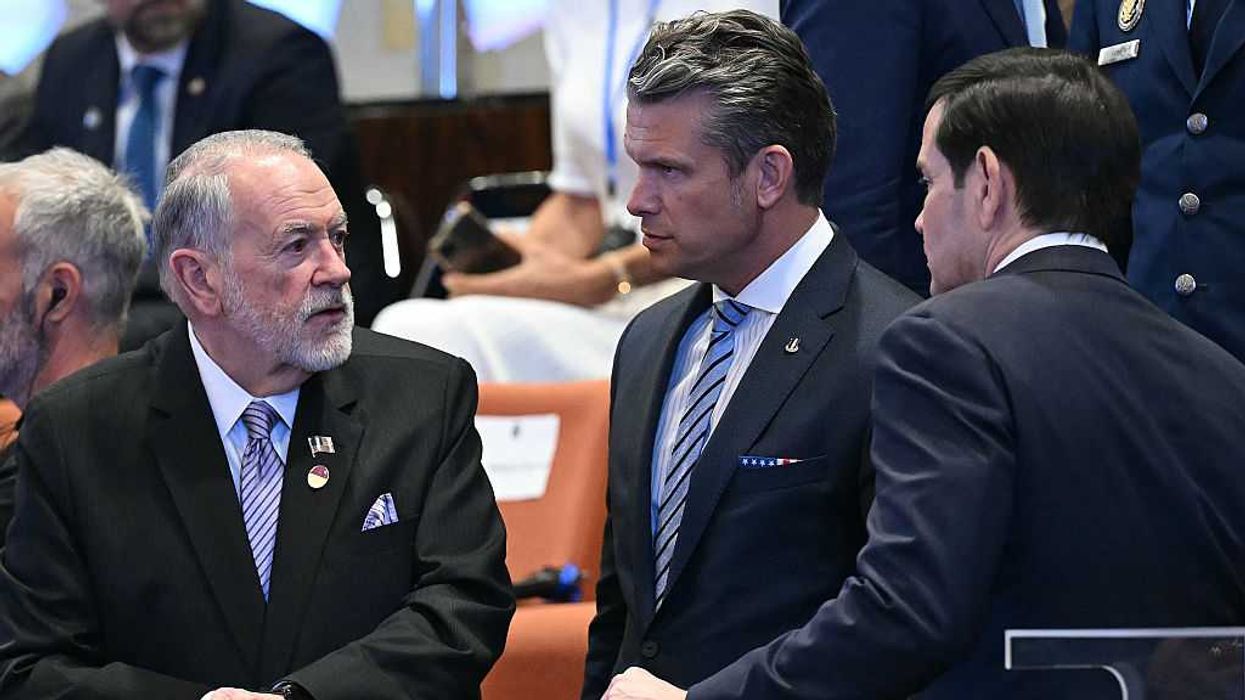
As Operation Epic Fury enters its fourth day of attacks against Iran, Mike Huckabee, the United States ambassador to Israel, gave a message to Americans stranded in Israel, which is now enduring airstrikes from Iran.
On Tuesday morning, Huckabee released a video that was just under four minutes long with instructions for Americans on what to do amid the ongoing attacks.
'The US embassy is not in a position at this time to evacuate or directly assist Americans in departing Israel.'
Huckabee gave an outline of the "fairly limited" options for Americans seeking to leave Israel.
"What we are recommending to all of our American citizens, including our own embassy staff, is follow the directions of Home Front Command, which are right now to shelter in place and to be close to a shelter at all times," Huckabee said. "Follow the alerts. If you hear the siren, make sure you take cover. That's the best thing you can do."
RELATED: US service member death toll continues to rise amid Operation Epic Fury
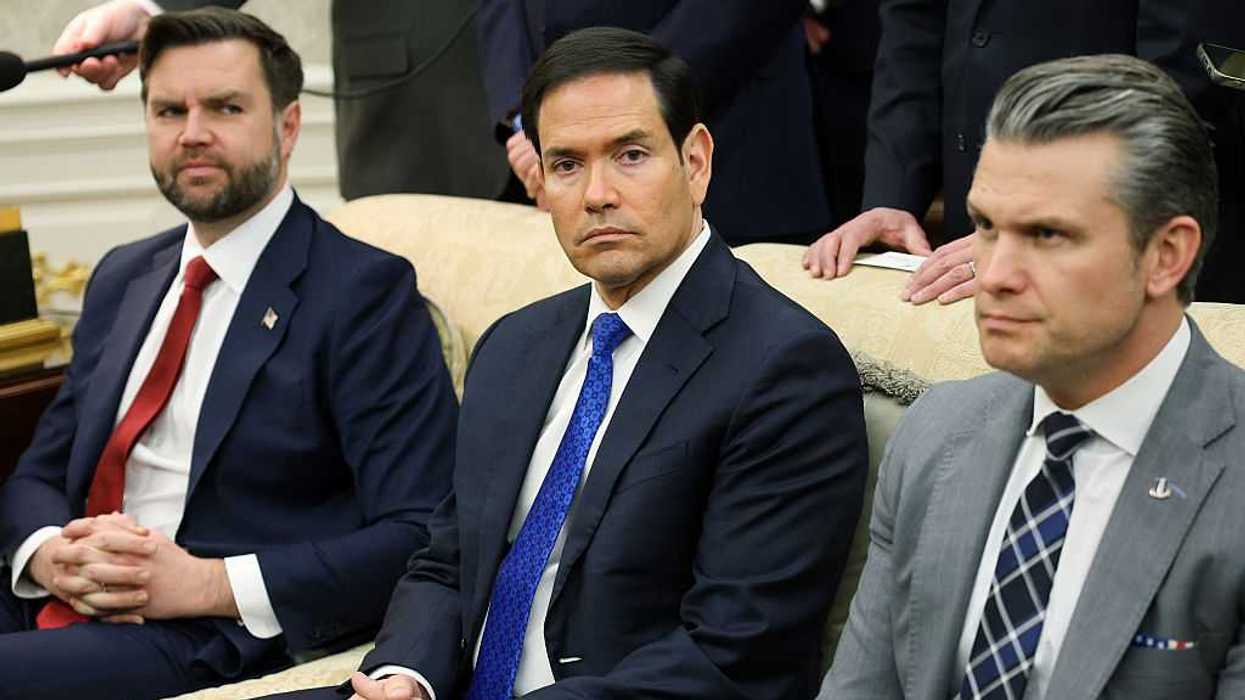 Photo by Win McNamee/Getty Images
Photo by Win McNamee/Getty ImagesThe Home Front Command is an arm of the Israel Defense Forces responsible for search-and-rescue missions in Israel and around the world, according to the HCF website.
Huckabee stressed that all Americans in Israel and the surrounding area should sign up for the State Department's STEP program, which communicates necessary updates to U.S. citizens.
The ambassador to Israel added one other option, though there are obvious risks and uncertainties involved with it as well: "In addition, the Israeli Ministry of Tourism is providing bus service from several locations — Herzliya, Tel Aviv, Haifa, and Jerusalem — to go to Taba, just across the border in Egypt, and from there, flights could be available from the Taba airport, though there are limited flights. But also ground transportation would be able to be obtained in Taba to go on to Cairo, where the airport is operating normally and efficiently."
Ground transportation from Tel Aviv to Taba takes an estimated four hours of travel. It takes between six and 10 hours by bus from Taba to Cairo.
The U.S. embassy for Jerusalem echoed Huckabee's instructions about finding an escape route while saying what Americans in the Middle East never wish to hear during an armed conflict in the region: "The U.S. embassy is not in a position at this time to evacuate or directly assist Americans in departing Israel."
Secretary of State Marco Rubio released a similar message on Monday night encouraging Americans to sign up for the STEP program for up-to-date situation notifications. Rubio also announced that the State Department, immediately after Operation Epic Fury commenced, "activated a 24/7 task force, surging personnel and resources necessary to help provide American citizens with up-to-the-minute safety and security information."
The State Department issued a "worldwide caution" warning on February 28.
Like Blaze News? Bypass the censors, sign up for our newsletters, and get stories like this direct to your inbox. Sign up here!
- 'Despicable' homicide suspect caught on body cam pointing gun at Florida deputy — and pulling trigger, cops say Tue, 03 Mar 2026 18:40:00 +0000

A "despicable" homicide suspect was caught on bodycam video pointing a gun at a Florida deputy and pulling the trigger, the Charlotte County Sheriff's Office said Monday.
Authorities said the Feb. 20 incident took place in Port Charlotte, which is about an hour southeast of Sarasota.
'Let me be clear: This individual is lucky to be alive today.'
Deputies got word that two suspects from a Sarasota County burglary were driving through their jurisdiction in a rental car, officials said.
After observing a traffic violation, deputies stopped the car and made contact with the occupants, officials said.
The driver was identified as 41-year-old Amy Lee; the passenger refused to provide his identification, officials said.
At first, neither Lee nor the passenger complied with deputy commands to exit the vehicle, but officials said they soon obeyed when they were told they would be arrested for obstruction.
Officials learned that Lee was arrested last year on multiple felony charges and that her co-defendant in those cases was 55-year-old Brian Hewson. He turned out to be the passenger in the rental vehicle, and he also had multiple warrants for his arrest, officials said.
Hewson "immediately resisted" when deputies tried placing him under arrest, and a deputy drew his agency-issued taser while shouting a warning, officials said.
But Hewson pulled a concealed firearm, pointed it directly at the deputy, and pulled the trigger, officials said.
However, there was no round in the chamber of the loaded gun, officials said, and it didn't fire.
With that, the deputy discharged additional taser probes — yet Hewson still tried to re-rack the gun, officials said.
"Thankfully, due to the neuromuscular incapacitation, Hewson was unable to maintain control of the gun, and it was secured by deputies," officials said.
RELATED: Florida felon named Blackie accused of pointing gun at vehicle in fit of road rage
Officials said Hewson was arrested for multiple warrants — including one for homicide in Pennsylvania, one for failure to appear in Pennsylvania, and charges in Lee County related to trafficking stolen property.
He also was charged with aggravated assault on a law enforcement officer for intentionally pointing a firearm at a CCSO deputy, possession of a firearm by a convicted felon, possession of a controlled substance (1.1 grams of fentanyl found in the vehicle), resisting with violence, and possession of drug paraphernalia, officials said.
He was being held at the Charlotte County Jail without bond, officials said.
 Brian Hewson. Image source: Charlotte County (Fla.) Sheriff's Office
Brian Hewson. Image source: Charlotte County (Fla.) Sheriff's Office“Let me be clear: This individual is lucky to be alive today," Sheriff Bill Prummell said, adding that "I want to be sure it is understood that my deputies are trained to eliminate a lethal threat with deadly force. They deserve to go home to their families after their shift. This despicable human tried to take one of my deputies out instead of being a man and accepting accountability for his own decisions. Now he will face the justice he has tried to dodge for so long ... and I hope he spends the rest of his days behind bars.”
The sheriff's office added in its Facebook post about the incident that "as a point of clarification: We see a few people questioning why our deputy went taser instead of lethal. The answer to that is that he already had the taser in hand before the firearm was seen. Had our deputy attempted to switch from taser to firearm, he likely would have already been shot. The reaction, in the moment, is to use the taser that was already drawn and aimed to incapacitate the suspect. As you can see in the video, this happened VERY quickly."
Like Blaze News? Bypass the censors, sign up for our newsletters, and get stories like this direct to your inbox. Sign up here!
- The SAVE Act NEEDS to pass ... and it’s THIS simple Tue, 03 Mar 2026 18:30:00 +0000
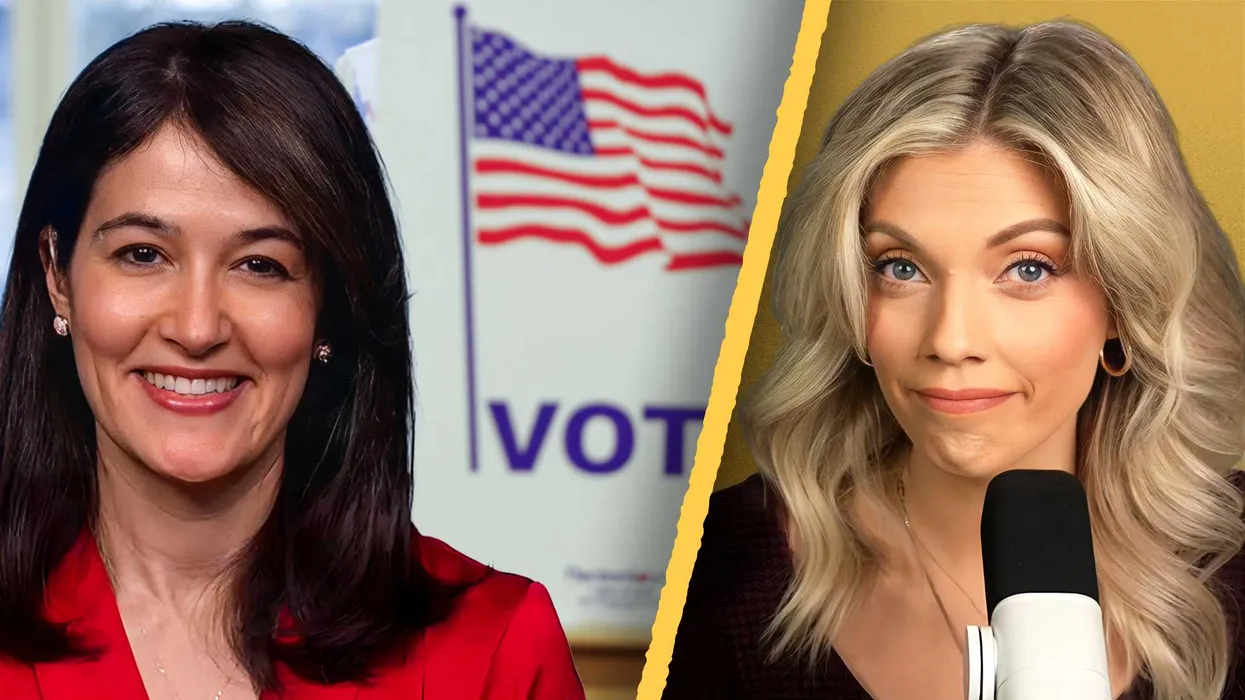
The SAVE America Act is a common-sense bill that would ensure American citizens would decide American elections by requiring voter ID and getting rid of mail-in ballots — which BlazeTV host Liz Wheeler could not be more on board with.
“It’s basically just elementary voter ID. This should have been passed weeks ago. Why hasn’t it been?” BlazeTV host Liz Wheeler asks, before introducing the vice president of programs at the Conservative Policy Institute, Rachel Bovard.
“She knows what’s going on and who is to blame and what needs to happen to get the SAVE Act passed,” Wheeler says.
“It has passed out of the House — twice, actually. So what we’re dealing with: You have the SAVE Act, and then you have the SAVE America Act. And that is where we are now focusing, is the SAVE America Act,” Bovard explains.
“We had to do a second vehicle, because the SAVE Act passed out of the House in April. It went over to the Senate, where it was then referred to the Senate Rules Committee. And Mitch McConnell is the chair of the Senate Rules Committee and doesn’t like this bill,” she says.
“I don’t know why. Inexplicably. He’s never spoken on it. He doesn’t like it,” she adds.
That’s when House and Senate conservatives, working together on the issue, tweaked the bill to reintroduce it as the SAVE America Act.
“They sent it over to the Senate, and they did something very strategic this time around. They packaged it in such a way, in what we call a message. So they sent it over to the Senate as a message. Meaning, normally, to get on a bill in the Senate, you have to overcome a filibuster. When you have a message, it’s privileged. You don’t. So you can get onto the bill, bypassing the filibuster altogether,” Bovard tells Wheeler.
“And the second thing that was so brilliant about what they did was when it comes over as a message, it doesn’t get referred to committee. It sits at the desk, where it is just now waiting for Majority Leader John Thune to call it up. Now, will it be subject to a filibuster then? I assume it will,” she says, pointing out that there are two ways to break a filibuster.
“The one everyone’s very familiar with is invoking cloture, which is 60 votes. But the other way is through physical exhaustion, which is the old-fashioned way, which is making senators stand and speak until they physically cannot do so any longer and then putting the question,” she continues.
“So instead of having to break through 60 votes, you break through physical exhaustion, and then in both cases, once you’ve broken the filibuster, the bill passes a simple majority," she says. “So that is where things stand right now.”
Want more from Liz Wheeler?
To enjoy more of Liz’s based commentary, subscribe to BlazeTV — the largest multi-platform network of voices who love America, defend the Constitution, and live the American dream.
- Living human brain cells are training a chatbot to be 'more like us' Tue, 03 Mar 2026 17:50:00 +0000

A company recently revealed its human-brain-cell-driven chatbot that it has taught to play video games.
However, even though the program runs on real human cells, it is still hallucinating answers.
'It could be more able to use biological intelligence in a meaningful way.'
The company, Cortical Labs, shared a video recently that showed its brain-cell-operated large language model responding in real time to a user prompt. Return reported on the company last year for using brain cells grown on a silicon "chip" for an organic computer. The tech is referred to as synthetic biological intelligence, and the company now appears to have a room full of such computers.
"This is a whole new paradigm to how ... the syntax of the LLM can be more like us," a company rep said in the video.
Boasting about his brain-powered chatbot, the voiceover added, "It could be more able to use biological intelligence in a meaningful way to select the next token and to create better responses."
This example immediately failed, though. When the user asked the program, "Tell me where you want to visit on vacation," the bot cited a place that does not exist.
"The Great Barrinchi Cove in the Maldives," it stated, before also suggesting "Tuscany, Italy, for its rolling hills, stunning views."
Despite the complex technology, these types of "hallucinations" are common with AI chatbots and are a somewhat typical occurrence for any frequent chatbot user.
In 2022, Cortical Labs said it had successfully taught 800,000 living brain cells to learn how to play the game Pong. The cells were linked to a computer to gradually learn to sense the position of the game's ball and control the virtual paddle.
"If we allow these cells to know the outcome of their actions, will they actually be able to change in some sort of goal-directed way?" Chief Scientific Officer Brett Kagan asked at the time.
Since then, and after a bevy of requests, the company has advanced its model to play a more complex game: Doom.
The crude shooter game represents a 21-year jump in technological understanding for the program, given that Doom came out in 1993 and Pong in 1972.
RELATED: Trump fired Anthropic for being 'leftwing nut jobs,' but the company's AI is conquering the internet
The recent demo also showed an incomplete answer provided by the chatbot when asked to explain the meaning of life.
It answered, "The meaning of life is a philosophical question that has been pondered by thinkers and scholars across various cultures and religions for centuries."
It went on, "It explores the fundamental question of what purpose or ultimate meaning lies in human existence."
"Different interpretations may vary widely," it added before ending abruptly.
Cortical Labs has made its research publicly available, letting the viewer decide if the company is indeed creating science "for the greater good," as it has stated.
Like Blaze News? Bypass the censors, sign up for our newsletters, and get stories like this direct to your inbox. Sign up here!
- Here's what the war in Iran means for you at the gas pump Tue, 03 Mar 2026 17:35:00 +0000
- Watch: Bill Clinton defends Trump in Epstein deposition video Tue, 03 Mar 2026 16:45:00 +0000

Former President Bill Clinton testified under oath that President Donald Trump never indicated any improper involvement with Jeffrey Epstein, according to video released Monday by the House Oversight Committee.
In a 4.5-hour deposition Friday in Chappaqua, New York, as part of the committee’s Epstein probe, Clinton went out of his way to defend Trump. Despite no "follow-up question" compelling him to do so, Clinton interrupted the proceedings to note that he did not want to "leave the impression" that Trump ever mentioned to him any involvement "in anything improper with regard to Epstein."
Clinton then recalled a conversation with Trump from around 2002 or 2003 at a charity golf tournament at "his golf course" when Trump mentioned his past association with Epstein.
'I saw nothing, and I did nothing wrong.'
Clinton said Trump told him about Epstein: “You know, we had some great times together over the years, but we fell out all because of a real estate deal.”
“The president never ... said anything to me to make me think he was involved with anything improper with regards to Epstein either, he just didn't,” Clinton stated.
He later emphasized, “I have no information that he did anything wrong.”
RELATED: Iranian state TV hijacked with Trump, Netanyahu message urging citizens to 'seize control'
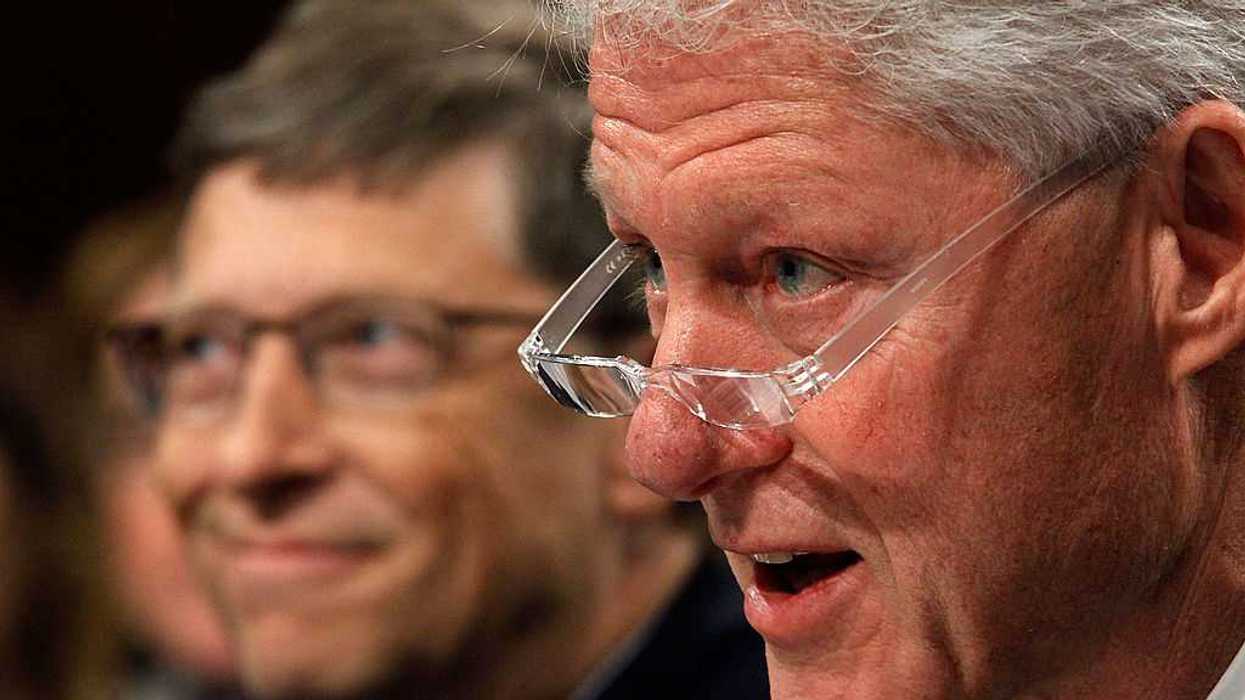 Photo by Chip Somodevilla/Getty Images
Photo by Chip Somodevilla/Getty ImagesAbout his own associations with Epstein, Clinton declared in his opening statement: “I saw nothing, and I did nothing wrong.” He emphasized he had “no idea of the crimes Epstein was committing” and saw no signs of abuse.
The committee released videos of both Bill Clinton's and Hillary Clinton’s depositions on Monday.
Republicans highlighted Clinton’s comments on Trump, with Chairman James Comer (R-Ky.) calling it an exoneration. Democrats have pushed for Trump to testify as well.
Neither the Clintons nor Trump have been formally accused of wrongdoing in Epstein’s crimes.
Like Blaze News? Bypass the censors, sign up for our newsletters, and get stories like this direct to your inbox. Sign up here!
- US service member death toll continues to rise amid Operation Epic Fury Tue, 03 Mar 2026 16:00:00 +0000

Since the start of the attacks on Iran on Saturday, the United States and Israel have hit Iranian military capabilities hard. However, those attacks have also come at a steep cost for the United States as Iran retaliates against the joint strikes.
U.S. Central Command published a heartbreaking update to the number of U.S. service members killed since the war began.
'Major combat operations continue.'
On Monday afternoon, CENTCOM wrote: "As of 4 pm ET, March 2, six U.S. service members have been killed in action. U.S. forces recently recovered the remains of two previously unaccounted for service members from a facility that was struck during Iran's initial attacks in the region."
"Major combat operations continue. The identities of the fallen are being withheld until 24 hours after next of kin notification," the post added.
RELATED: Netanyahu denies forcing US into war after mixed messages from Rubio, Johnson
 Photo by Alex Wong/Getty Images
Photo by Alex Wong/Getty ImagesCBS News reported that Secretary of War Pete Hegseth confirmed that an incoming munition hit a tactical operations center in Kuwait, resulting in U.S. fatalities.
CENTCOM reported on Sunday that three service members had died. The number rose to four by Monday morning as another service member "succumbed to their injuries."
The identities of the service members have not been made public.
Like Blaze News? Bypass the censors, sign up for our newsletters, and get stories like this direct to your inbox. Sign up here!
- Female, 46, forces her way into home, attacks homeowner, cops say. But it's yet another poorly chosen home invasion target. Tue, 03 Mar 2026 15:15:00 +0000

A 46-year-old female forced her way into an Iowa home over the weekend and attacked the homeowner, police said. But the homeowner was armed with a gun and used it to shut down the attack.
Des Moines police were called just before 11 p.m. Saturday to a residence in the 1500 block of Guthrie Avenue in the Union Park neighborhood after a 911 caller said an intruder was attacking the homeowner, KCCI-TV reported.
Investigators told KCCI the homeowner reported hearing someone yelling in the back yard — and then someone banging on the back door.
While officers were on their way to the home, the caller told dispatchers the intruder had been shot, the station said.
When officers arrived, they found Stannita Wilson inside the home with multiple gunshot wounds, KCCI said.
Officers provided first aid until Des Moines Fire Department rescue personnel arrived and transported Wilson to MercyOne Des Moines Medical Center for treatment, the station said.
Investigators told KCCI the homeowner reported hearing someone yelling in the back yard — and then someone banging on the back door.
When the homeowner unlocked the door, Wilson allegedly forced her way inside and began assaulting the resident, the station said.
But the homeowner was armed with a handgun and shot Wilson during the incident, police told KCCI.
Wilson’s injuries were described as minor, the station said.
After she was treated and released from the hospital, KCCI reported that Wilson was charged with second-degree burglary, a Class C felony.
Police added to the station that Wilson was not known to the homeowner — and as of Sunday, no charges had been filed against the homeowner.
Radio Iowa indicated that the homeowner is a male.
The incident remains under investigation, KCCI said.
Like Blaze News? Bypass the censors, sign up for our newsletters, and get stories like this direct to your inbox. Sign up here!
- Iran strikes unpacked: Glenn Beck breaks down the chaos — but hold your verdict, he says Tue, 03 Mar 2026 15:00:00 +0000

Over the weekend, the United States and Israel launched joint military strikes on Iran, targeting its leadership, nuclear facilities, ballistic missile sites, and military infrastructure, and ignited an ongoing war, sparking Iranian retaliatory attacks across the region.
On this episode of “The Glenn Beck Program,” Glenn Beck and his chief researcher, Jason Buttrill, break down the most important events, the intelligence behind the operation, the scale of military buildup leading up to the strike, and what could come next.
Turning to the standout moment of the strikes, Glenn emphasizes the killing of Ayatollah Ali Khamenei: “We knew exactly where this guy was ... and we gave the information to Israel and said, ‘You want to go get that guy? Go get that guy,’ and they bombed precision, and it was remarkable what happened,” he says.
Although celebrations of Khamenei's death as a potential step toward liberation are widespread among some Iranians and Iranian-Americans, they are deeply tempered by the devastating strike on a girls' elementary school in southern Iran that killed over 150 people, predominantly young female students and staff.
The Iranian regime state media has framed the incident as a deliberate, blatant crime by the U.S. and Israel, but Glenn isn’t buying that narrative.
“Our military does not have evil in their hearts. We are not targeting schools. This is war,” he says, noting that sadly, “accidents do happen.”
President Trump, he says, “knows how to carry a very big stick,” and these military strikes on Iran are not only about toppling the regime and preventing Iran from acquiring nuclear weapons; they’re also about sending a clear message to the world: “Don’t ever mess with them.”
“That’s how you keep the peace,” says Glenn.
Jason then displays a chart illustrating the massive scale of military firepower deployed in this operation.
“It is significant — more than we've seen in a very, very long time,” he says, calling the air and naval power involved “absolutely insane.”
Even though there have been no reports of special forces on the ground in Iran, Glenn speculates that it's highly likely U.S. teams are operating there covertly.
“Anybody says we won't have anybody on the ground ... I find that highly unlikely because if there is nuclear material, we are going to have to get it out ... to secure the nuclear facilities,” he explains.
“We saw this the last time when Israel and the United States struck the nuclear targets a few months ago. They had Israeli special forces on the ground picking targets out. I would assume there's something similar to that,” adds Jason.
“There's also the idea of what happens to a lot of these radicals as they try to flee out of the area. My guess is they're probably gonna go to Iraq,” he continues.
Glenn acknowledges that “Iraq could become the next Iran” but emphasizes that we need time to observe the fallout from this military operation.
“Anybody who was definitively saying, ‘this is the greatest thing ever,’ or definitively saying, ‘this is the worst thing ever’ — they're fools. Do not listen to them,” he urges. “This could be really, really good. This could be really, really bad.”
“What you have to ask is: Do you trust the person who is in command of this?”
To hear more of Glenn and Jason’s analysis, watch the video above.
Want more from Glenn Beck?
To enjoy more of Glenn’s masterful storytelling, thought-provoking analysis, and uncanny ability to make sense of the chaos, subscribe to BlazeTV — the largest multi-platform network of voices who love America, defend the Constitution, and live the American dream.
- Tuesday’s must-watch primaries: The races that will determine if America First takes over in 2026 Tue, 03 Mar 2026 14:57:20 +0000
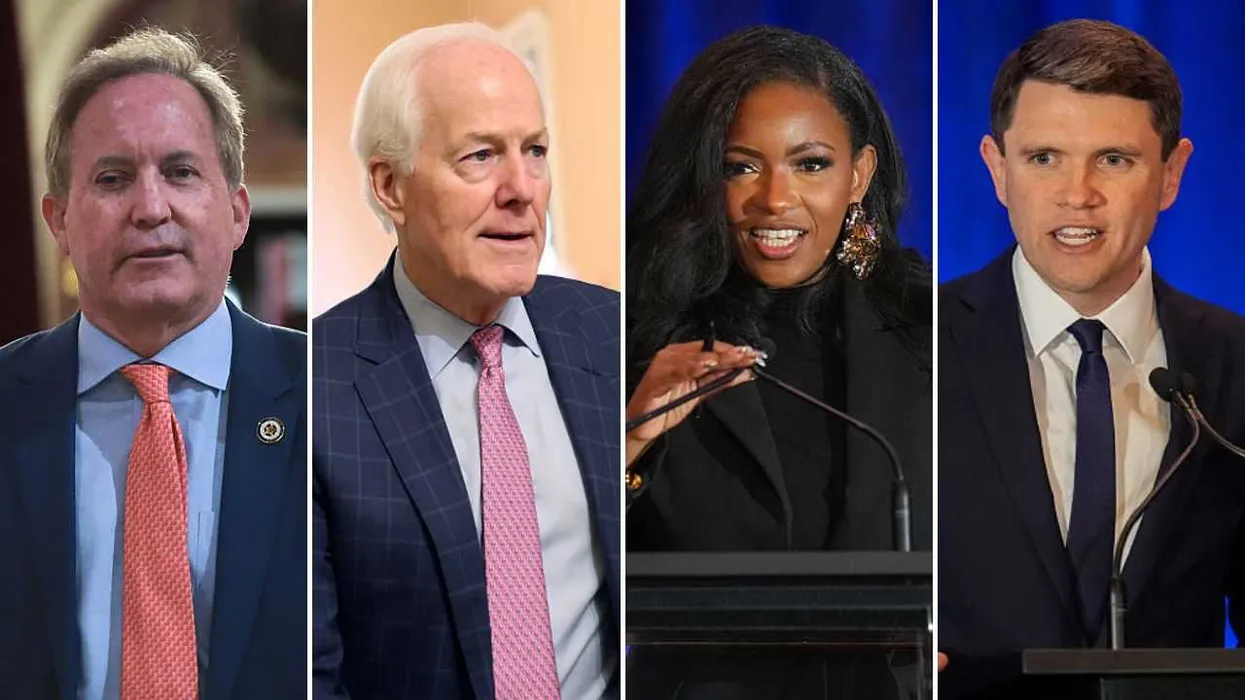
Voters in three states head to the polls on Tuesday, March 3, in the first major test of whether the America First movement will dominate the 2026 midterms, as several prominent Republican incumbents face key primary challenges.
'I just haven't made a decision on that race yet.'
Texas
The highest-profile race Tuesday is arguably the Senate primary matchup between incumbent Sen. John Cornyn, Texas Attorney General Ken Paxton, Rep. Wesley Hunt, and several other Republican candidates.
It is the most costly Senate primary race in history, with over $122 million spent. Cornyn, who was first elected in 2002, accounts for over 57% of total spending, with $69 million in ad buying by his campaign and outside groups. Total ad buy in support of Hunt is $12 million; for Paxton, $4.1 million.
Paxton has accused Cornyn of betraying Trump and the America First movement.
“I’m running to beat Fake Republican John Cornyn. The race is a DEAD HEAT,” Paxton said on Monday as part of an effort to encourage his conservative supporters to contribute to his campaign.
 Photo by Richard Rodriguez/Getty Images
Photo by Richard Rodriguez/Getty ImagesCornyn warned Texans not to vote for Paxton.
“Ken Paxton will be the kiss of death for Republicans on the ticket in November of 2026,” Cornyn said in February.
"I think the attorney general, if he's the nominee, could very well lose the seat," he continued. "But if he doesn't lose the seat, he's not going to win except by the hair of his chin. And unfortunately, that will not help the down-ballot races."
President Donald Trump has not endorsed any candidates in the Texas Senate GOP primary race.
"I just haven't made a decision on that race yet," Trump told reporters in February.
"I like all three of them," Trump said, referring to Cornyn, Paxton, and Hunt. "Actually, I like all three. Those are the toughest races. They've all supported me. They're all good, and you're supposed to pick one, so we'll see what happens."
Also seeking to take over Cornyn's seat, on the Democrat side, U.S. Rep. Jasmine Crockett is facing off against state Rep. James Talarico. Total ad spending in support of Crockett reaches roughly $4.5 million, with $20.8 million for Talarico.
A poll from the University of Texas at Tyler showed Crockett, who received an endorsement from former Vice President Kamala Harris last week, with a double-digit lead over Talarico.
“Heading into Election Day, especially with multiple polls showing me ahead," Crockett told her supporters, "I want you to be ready to tune out the noise, the falsehoods, and the onslaught of attacks from D.C. insiders, the Epstein class, and all those who benefit from the status quo.”
RELATED: Cardi B and Kamala Harris endorse Jasmine Crockett for pivotal US Senate race in Texas: 'Okurrr'
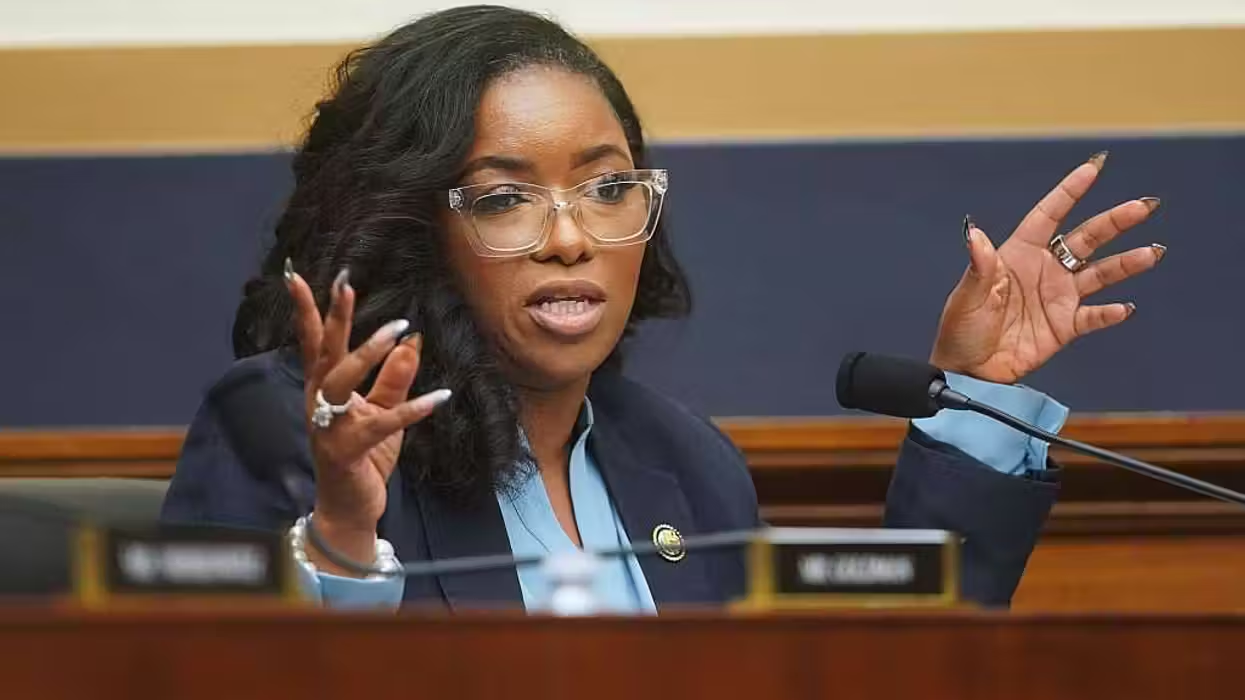 Jasmine Crockett. Photo by Al Drago/Getty Images
Jasmine Crockett. Photo by Al Drago/Getty ImagesWith Paxton running in the Senate election, multiple Republicans have thrown their hats into the ring to become the state's next attorney general, including Rep. Chip Roy, attorney Aaron Reitz, and state Senators Mayes Middleton and Joan Huffman.
Texas voters will also select their nominee in the gubernatorial primary election, with the general election scheduled for November 3. Gov. Greg Abbott (R) is seeking a fourth term and faces several challengers.
There are also 38 U.S. congressional seats in Texas up for grabs in Tuesday's election.
Incumbent Rep. Tony Gonzales is up for re-election amid a political crisis over a scandal involving a former staffer who died by suicide. Gonzales is set to have a rematch against Brandon Herrera, a firearms influencer who nearly beat Gonzales in a 2024 runoff.
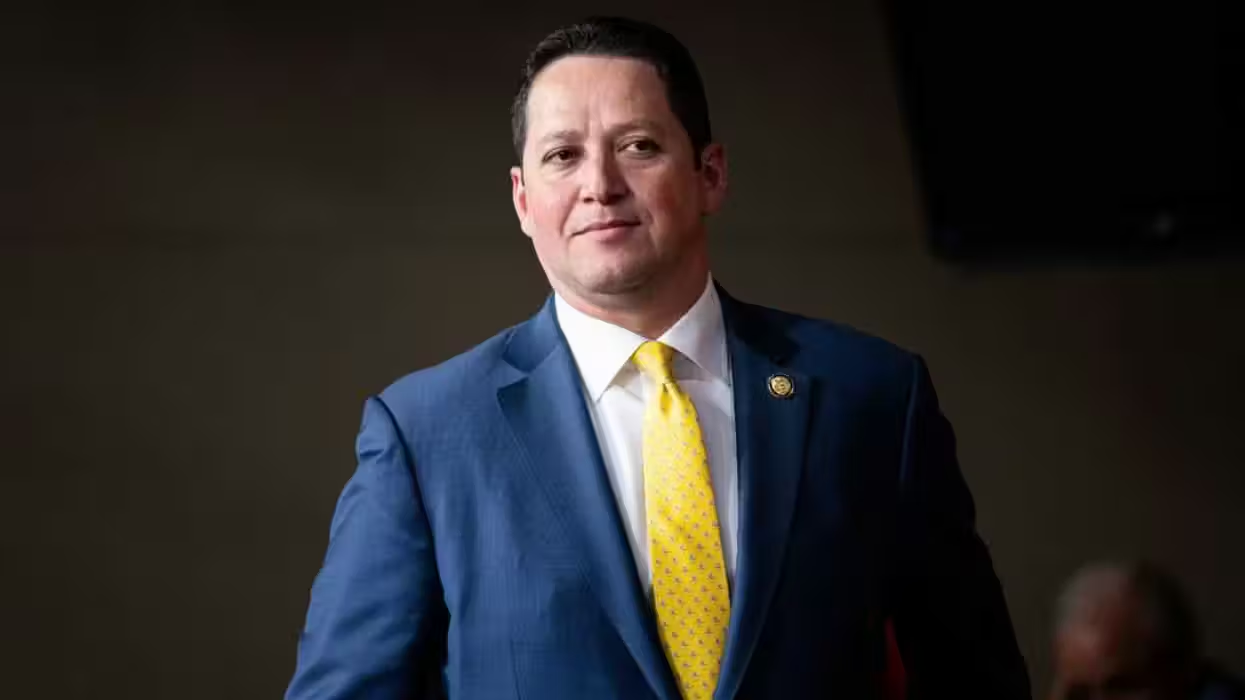 Tony Gonzales. Bill Clark/CQ-Roll Call Inc./Getty Images
Tony Gonzales. Bill Clark/CQ-Roll Call Inc./Getty ImagesIncumbent Rep. Dan Crenshaw (R), elected to the House in 2018, is the only Texas Republican incumbent who has not received Trump's endorsement this election cycle. He is facing competition from three Republican candidates: attorney Martin Etwop, Army veteran Nicholas Plumb, and state Rep. Steve Toth.
Polling in Texas opens at 7:00 a.m. and closes at 7:00 p.m local time. Voting in the Republican or Democrat primary does not require party affiliation. However, voters who choose to participate in one party's primary will be affiliated with that party for the rest of 2026. This affiliation will prevent those voters from casting ballots in the other party's runoff election.
If no candidate secures more than 50% of the primary vote, the top two candidates will advance to a runoff election on May 26.
North Carolina
In June, Sen. Thom Tillis (R) announced his retirement, prompting a dozen candidates, including six Republicans and six Democrats, to run for his seat. Former Republican Party Chair Michael Whatley, who secured Trump's endorsement, is the most prominent name on the GOP side. Former Gov. Roy Cooper is leading the Democrat primary election.
 Donald Trump and Michael Whatley. Photographer: Cornell Watson/Bloomberg/Getty Images
Donald Trump and Michael Whatley. Photographer: Cornell Watson/Bloomberg/Getty ImagesNorth Carolina voters will also cast their ballots to select 14 candidates for the U.S. House of Representatives.
Polls open at 6:30 a.m. and close at 7:30 p.m. local time. The state holds partially closed elections, in which voters can select only their party's ballots. Unaffiliated voters may choose a Republican or Democratic ballot, but they cannot vote in more than one primary.
In North Carolina, a runoff election is triggered when the second-place candidate requests it, but this applies only in primaries where the first-place candidate receives 30% or less of the vote. The state's potential runoffs would be held on May 12.
Arkansas
Arkansas Gov. Sarah Huckabee Sanders (R) is up for re-election. While she is running unopposed in the Republican primary, Democrats have a contested primary on Tuesday to choose who will face Sanders. Democrats will decide between state Sen. Fredrick Love and businesswoman Supha Xayprasith-Mays. Libertarian Party candidate Colt Shelby will be on the ballot in the general election on November 3.
Incumbent Sen. Tom Cotton (R), who took office in 2015, is competing to retain his seat against two Republican candidates: Pastor Micah Ashby and Arkansas State Police Trooper Jeb Little.
RELATED: 3 contentious Texas primaries that hang in the balance
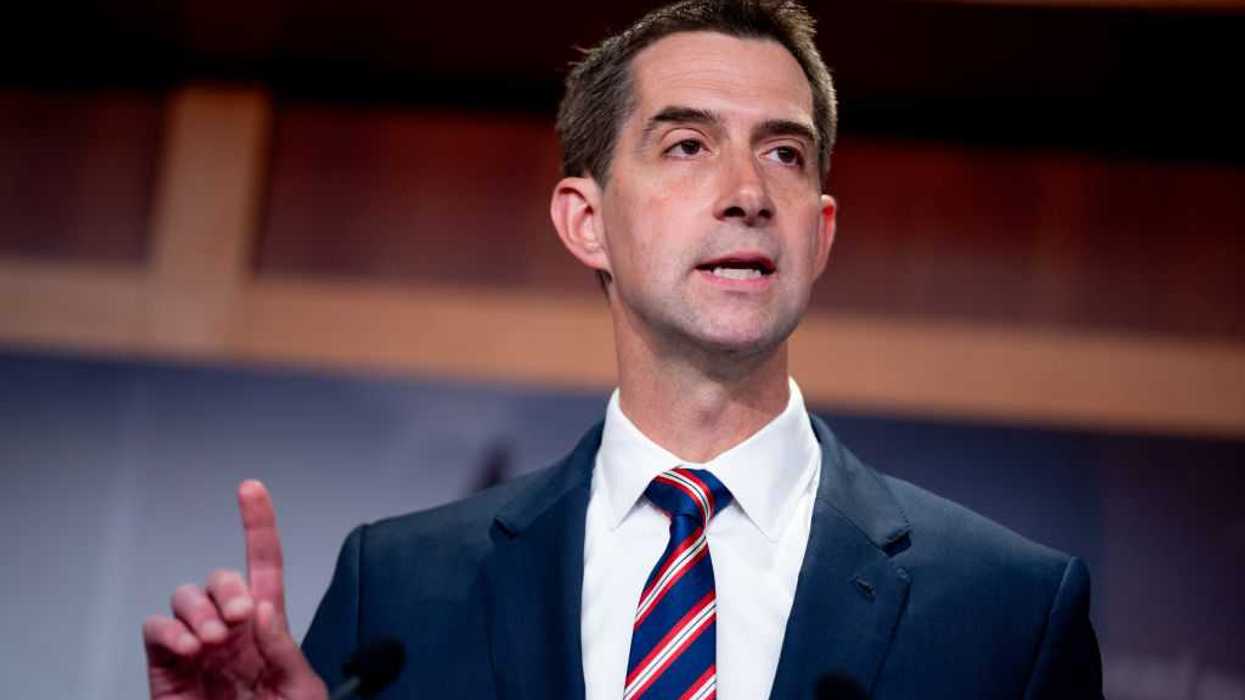 Tom Cotton. Photo by Andrew Harnik/Getty Images
Tom Cotton. Photo by Andrew Harnik/Getty ImagesAll of Arkansas' four U.S. House districts are holding primary elections on Tuesday.
Arkansas' polling sites will be open from 7:30 a.m. to 7:30 p.m. local time. The state conducts open primaries, allowing voters to select either a Republican or Democratic ballot at the polls without registering with the chosen party.
The state's runoff elections are triggered if no candidate secures more than 50% of the vote. These runoff elections would be held on March 31.
Like Blaze News? Bypass the censors, sign up for our newsletters, and get stories like this direct to your inbox. Sign up here!
- Netanyahu denies forcing US into war after mixed messages from Rubio, Johnson Tue, 03 Mar 2026 14:40:00 +0000

In his Monday appearance on Fox News' "Hannity," Israeli Prime Minister Benjamin Netanyahu defended the latest U.S.-Israeli military operation against Iran and denied the dominant interpretation of Secretary of State Marco Rubio's and House Speaker Mike Johnson's recent remarks about the genesis of the attacks.
Compelled to act?
The Trump administration attempted on Monday to address the mounting confusion about the justification and objectives for the Iran strikes.
'We knew that that would precipitate an attack against American forces.'
As part of this broader effort, Rubio told reporters on Capitol Hill, "Why now? The first is it was abundantly clear that if Iran came under attack by anyone, the United States or Israel or anyone, they were going to respond and respond against the United States."
"The assessment that was made that if we stood and waited for that attack to come first before we hit them, we would suffer much higher casualties," said Rubio.
"We knew that there was going to be an Israeli action, we knew that that would precipitate an attack against American forces, and we knew that if we didn’t preemptively go after them before they launched those attacks, we would suffer higher casualties and perhaps even higher [than] those killed," continued the secretary. "And then we would all be here answering questions about why we knew that and didn’t act."
House Speaker Mike Johnson (R-La.), a member of the Gang of Eight who was briefed ahead of the resumption of strikes against Iran on Feb. 28, echoed Rubio, suggesting to reporters that the strikes were a "defensive measure."
"Israel was determined to act in their own defense here with or without American support," said Johnson, suggesting further that Iran posed an "existential threat" to Israel, and its missile production was outstripping "our allies in the region."
RELATED: Iranian state TV hijacked with Trump, Netanyahu message urging citizens to 'seize control'
 Fatemeh Bahrami/Anadolu via Getty Images
Fatemeh Bahrami/Anadolu via Getty Images"Because Israel was determined to act with or without the U.S., our commander in chief and the administration and the officials I just named had a very difficult decision to make," continued Johnson. "They had to evaluate the threats to the U.S. — to our troops, to our installations, to our assets in the region and beyond — and they determined because of the exquisite intelligence that we had that if Israel fired upon Iran and took action against Iran to take out the missiles, then they would have immediately retaliated against U.S. personnel and assets."
The suggestion that probable blowback from an ally's planned preemptive attack on another country forced America's involvement in a deadly conflict prompted outrage and debate — even on the right.
Conservative commentator Matt Walsh, for instance, said in response to Rubio's statement, "So he's flat out telling us that we're in a war with Iran because Israel forced our hand. This is basically the worst possible thing he could have said."
RELATED: Poll: GOP voters' lukewarm support for Iran strikes significantly lower than past conflicts
 Photo by Joe Raedle/Getty Images
Photo by Joe Raedle/Getty ImagesOn the flip side, National Review editor Philip Klein suggested that critics had misconstrued Rubio's meaning.
Klein noted that later in Rubio's press conference, the secretary of state said that the U.S. was not forced to strike because of an impending Israeli action and that "this operation needed to happen because Iran in about a year or a year and a half would cross the line of immunity, meaning they would have so many short-range missiles, so many drones, that no one could do anything about it because they could hold the whole world hostage."
'Nobody drags Donald Trump into anything.'
Democrats such as Sen. Ruben Gallego (Ariz.), Rep. Pramila Jayapal (Wash.), and former Biden White House Domestic Policy Council Director Neera Tanden made hay of Rubio's and/or Johnson's remarks as did Iran's Foreign Minister Abbas Araghchi, who stated, "Mr. Rubio admitted what we all knew: U.S. has entered a war of choice on behalf of Israel. There was never any so-called Iranian 'threat.' Shedding of both American and Iranian blood is thus on Israel Firsters."
The outrage over the suggestion that America's hand was forced not by an enemy but by a friend appears to have prompted a response from President Donald Trump, who noted on Monday evening,
The Radical Left Democrats, a Party that has completely lost its way, are complaining bitterly about the very necessary and important attack, by the United States and Israel, on Iran. What most people understand is that they are only complaining BECAUSE I DID IT and, if I didn’t do it, they would be screaming — Why didn’t “TRUMP” attack Iran, he should do it, IMMEDIATELY?
Trump then urged his followers to watch Netanyahu's interview on Fox News, where Hannity asked the Israeli prime minister about the forced-to-act claim.
"There are people that say, 'Well, the prime minister of Israel dragged Donald Trump into it,'" said Hannity. "As somebody that's been friends with him over 30 years, nobody drags Donald Trump into anything, number one, but I want to get your reaction to that."
Netanyahu laughed, then said, "Well, you're right. I mean that's — that's ridiculous. Donald Trump is the strongest leader in the world. He does what he thinks is right for America. He does also what he thinks is right for future generations, and frankly, we're partners in that effort."
The Israeli leader suggested that it was necessary to strike because Iran "started building new sites, new places, underground bunkers that would make their ballistic missile program and their atomic bomb programs immune within months. If no action was taken now, no action could be taken in the future."
Like Blaze News? Bypass the censors, sign up for our newsletters, and get stories like this direct to your inbox. Sign up here!
- Out of order: Courts shouldn’t rule based on ‘trust us’ science Tue, 03 Mar 2026 13:00:00 +0000

A training manual for federal judges just ditched its biased chapter on climate change. Good. But the same manual still peddles quackery about how science works — and it risks teaching the judiciary to treat models and “consensus” as proof.
The “How Science Works” chapter in the “Reference Manual on Scientific Evidence” invites judges to overvalue computer models built on unproven assumptions and to accept “consensus” as evidence even when empirical testing cuts the other way. That is not science. It is a distortion of the scientific method, which demands observation, experimentation, and results that can be challenged and falsified in the real world.
This is the posture of pseudoscience: conclusions protected by authority and repetition rather than disciplined testing against reality.
The problem runs deeper than emphasis. In defining hypothesis, theory, and scientific law, the writers omit testing, observation, and experimentation. They also fail to acknowledge that all three can be disproven — even though demonstrating falseness has long been central to scientific progress. Science advances not by protecting favored conclusions but by trying — relentlessly — to break them.
The chapter even claims that science cannot “disprove hypotheses.” That is historically indefensible. Science has disproven hypotheses repeatedly, and entire revolutions have turned on that process.
Geocentrism gave way to Copernicus’ heliocentric model. Phrenology, eugenics, spontaneous generation, and miasma theory all enjoyed “consensus” before evidence refuted them. Alfred Wegener’s plate tectonics also met decades of rejection before the evidence won. Consensus delayed the truth. It did not deliver it.
The chapter also stumbles over prediction. It says prediction is a logical consequence of a hypothesis, “not necessarily what will happen in the future.” That drains prediction of its most important feature: testable claims about what should occur under specified conditions. A hypothesis can be tested against the past as well, but the logic stays the same — it must match reality.
Then the chapter offers reassurance that reveals the posture: “The fact that there is room for improvement in the process of science does not necessitate distrust of hypotheses that have gained widespread acceptance in the scientific community and about which consensus has been achieved.” In practice, that treats consensus as a shield against contrary evidence — a common ploy among climate alarmists.
RELATED: Win for kids! Major surgeon group reverses course, comes out against child genital mutilation
 Photo by Jessica Rinaldi/Boston Globe via Getty Images
Photo by Jessica Rinaldi/Boston Globe via Getty ImagesIn places, the chapter contradicts itself, sometimes gesturing at rigor, elsewhere diminishing falsification and redefining key terms. The result is confusion. Its length and muddled definitions do not clarify how science works; they blur it. Worse, they introduce judges to wrongheaded practices — overuse of models and consensus — as if they can settle disputed scientific questions.
That is not the empirical tradition of Isaac Newton or Marie Curie. It is the posture of pseudoscience: conclusions protected by authority and repetition rather than disciplined testing against reality.
U.S. District Judge Robin Rosenberg removed the manual’s climate chapter after objections from state attorneys general and others. The National Academies of Sciences, Engineering, and Medicine still hosts the manual — including “How Science Works” — on its website.
Rosenberg, as head of the Federal Judicial Center, should take the next step and remove this chapter as well. Federal judges and the public they serve deserve a guide to science that prizes evidence over consensus and observation over simulation.
- When ‘be nice’ becomes the whole ethic, we’re in trouble Tue, 03 Mar 2026 11:00:00 +0000

The appeal to pity is the modern left’s favorite fallacy.
In logic, it is called argumentum ad misericordiam. Instead of showing that a policy is just or true, the speaker points to suffering and insists compassion requires agreement. It works because it weaponizes one of the strongest moral instincts in the American people: mercy.
- 3 young teenage boys charged as adults for alleged rape of 12-year-old girl in Miami Tue, 03 Mar 2026 10:30:00 +0000

Three young teenage boys have been charged as adults for a heinous crime that has horrified the community in Miami, Florida.
A 12-year-old girl said she left a friend's home on June 18, 2025, when she was allegedly accosted by three boys.
'I don't care if they get 10, 20, 30, 40, 50 years, 100 years. ... I'm gonna always feel like it's not enough.'
A 13-year-old boy dragged her to the Green Haven Project community garden in Overtown, according to police.
Two other boys, ages 12 and 14 years old, allegedly restrained the victim while the 13-year-old sexually battered her. A fourth person witnessed the incident, according to police.
One of the boys allegedly put rocks in her mouth to keep her from screaming. The children released her after hearing her father calling for his daughter, but the arrest report said the abuse lasted for about 30 minutes.
Police said they interviewed the witness, whose account corroborated the claims made by the victim. The witness said he did not intervene "because he was outnumbered and was afraid of getting beat up."
The three boys were initially arrested after the incident, but on Thursday the two younger suspects were booked into the Metro West Detention Center on adult charges. The older boy, who has since turned 15, is also facing adult charges.
Fifteen-year-old Xavier Tyson has been charged with sexual battery, false imprisonment, and lewd and lascivious conduct with a child. Thirteen-year-old Nelson Nunez has been charged with sexual battery on a minor by a minor and kidnapping, while 12-year-old Jusiah Jones has been charged with aggravated battery and false imprisonment.
Attorneys for Jones and Nunez said they pleaded not guilty and argued that they should not be held in adult jail.
RELATED: Former reality TV star accused of horrific sex crimes pleads not guilty — by reason of insanity
The victim's mother, who wants to remain anonymous, is demanding justice for her child.
"I don't care if they get 10, 20, 30, 40, 50 years, 100 years. ... I’m gonna always feel like it’s not enough," she said in an interview with WPLG-TV.
She also thanked the witness for coming forward.
Like Blaze News? Bypass the censors, sign up for our newsletters, and get stories like this direct to your inbox. Sign up here!
- Bill Gates’ double affair admission: Glenn Beck says he could be the first American jailed over Epstein — here’s why Tue, 03 Mar 2026 10:00:00 +0000
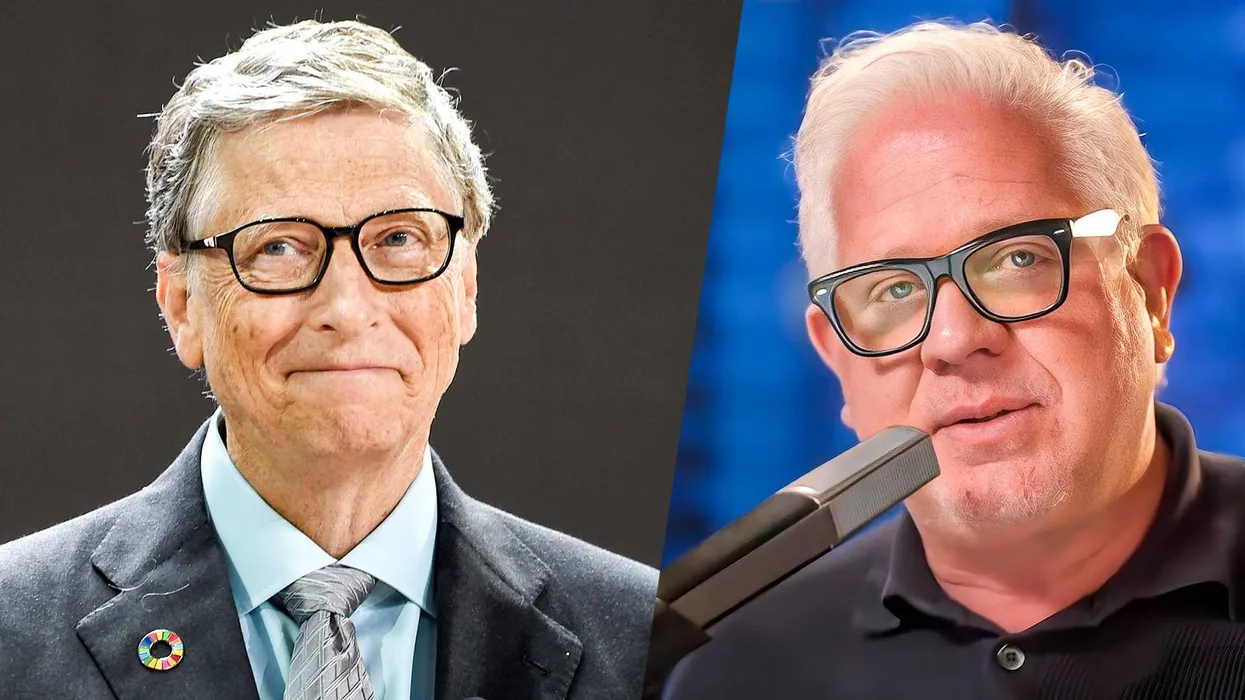
Following the Department of Justice’s third and largest Epstein file dump, Bill Gates admitted to having two affairs — one with a Russian bridge player and another with a Russian nuclear physicist.
These confessions might land the tech billionaire in hotter water than the kind that results from typical cheating scandals, Glenn Beck says.
“This is not about infidelity,” he says, but rather about a potential “honeypot operation.”
Gates’ unfaithfulness is neither a “private” nor a “personal” matter, Glenn says, because the bridge player, Mila Antonova, whom Gates admitted to having an affair with, “was financially assisted by Jeffrey Epstein after Epstein had already been convicted of sex crimes.”
“According to the DOJ released emails, Epstein attempted to use that relationship to pressure Bill Gates. That’s not gossip. That’s leverage,” he explains.
But there’s another layer that paints an even more compelling picture: “Antonova, the Russian bridge player, she was photographed with Anna Chapman,” who was “part of a Russian spy ring that was rolled up by the FBI in 2010,” Glenn says, adding that Chapman is “the daughter of a former KGB officer [and] deported intelligence asset.”
The suggestion that these two women are “hanging out” sounds both “dangerous and strategic,” he argues.
“Because Bill Gates is not just one of the wealthiest men in the world. His foundation influences global health policy. ... His technology platforms, even worse, are embedded in our government systems. He has real relationships tied to military and federal contracts,” Glenn declares. “He’s not a private citizen. He is a national security interest and risk.”
He then paints a hypothetical but chilling picture: “A wealthy American titan in a compromising relationship with a foreign national, facilitated or financially entangled by a convicted blackmailer with global connections.”
He asks pointedly: “If you were running an intelligence service in Russia, what would you call that? I would call that a honeypot operation.”
“If you were looking for leverage over someone with global vaccine influence, agricultural control, networks, data, infrastructure access, advisory roles across all kinds of administrations (his systems are tied into our Pentagon and everything else), you don’t need proof of wrongdoing. You’d only need the threat of exposure,” he adds.
“This is the convergence of Russian nationals, Epstein leverage attempts, ... known intelligence-linked figures, government and military influence, and financial entanglement. That’s a very wicked brew.”
While none of this suggests that Gates is guilty of “espionage” or was “knowingly part a foreign plot,” it does suggest something else, Glenn says: “He was in the position where someone could apply pressure.”
Given Gates’ connections to government, military, the Pentagon, and AI development, the mere possibility that he was susceptible to foreign manipulation could be cause for prosecution, Glenn suggests.
Since similar scandals have already rocked powerful people in Europe and elsewhere, he wonders if accountability is finally “coming home to America,” where thus far, no elites have faced criminal charges or prosecution for ties to Epstein.
Will Gates be the first?
To hear more of Glenn’s analysis, watch the video above.
Want more from Glenn Beck?
To enjoy more of Glenn’s masterful storytelling, thought-provoking analysis, and uncanny ability to make sense of the chaos, subscribe to BlazeTV — the largest multi-platform network of voices who love America, defend the Constitution, and live the American dream.
- Trump pleads not guilty to 34 felony counts
- Haberman reveals why Trump attacked judge and his family in speech Wed, 05 Apr 2023 13:30:09 GMT
CNN political contributor Maggie Haberman explains the reasoning behind Donald Trump's attacks on the judge and his family during a speech at his Mar-a-Lago resort after he was arraigned on felony charges. - What to know about the Trump indictment on the eve of his court appearance Wed, 05 Apr 2023 22:50:06 GMT
- READ: Trump indictment related to hush money payment
- Russian authorities detain suspect over St. Petersburg cafe blast
- Video shows moment of deadly explosion at cafe in Russia Tue, 04 Apr 2023 01:08:44 GMT
A well-known Russian military blogger, Vladlen Tatarsky, was killed in an explosion at a cafe in St. Petersburg, authorities said. CNN's Matthew Chance reports. - Wall Street Journal reporter Evan Gershkovich appeals against arrest, Russian state media says Mon, 03 Apr 2023 13:58:58 GMT
- Suspected Chinese spy balloon was able to transmit information back to Beijing Mon, 03 Apr 2023 13:38:22 GMT
The suspected Chinese spy balloon that transited the US earlier this year was able to capture imagery and collect some signals intelligence from US military sites, a source familiar with the matter tells CNN. - Beijing promised to 'fight back' over Taiwan leader's US visit. But this time it has more to lose Tue, 04 Apr 2023 07:49:53 GMT
An anticipated meeting between Taiwan's President Tsai Ing-wen and US House Speaker Kevin McCarthy in California this week has sparked concerns of a repeat of the pressure campaign China launched last year when then-Speaker Nancy Pelosi visited Taipei. - 'Scary, cold, hungry and lonely': Volunteer soldier shares experience on front line Mon, 03 Apr 2023 12:13:24 GMT
A young volunteer soldier, Akula, who signed up for the war at the beginning of the Russian invasion is now dealing with the trauma of war. He spoke to CNN's David McKenzie about his time on the front lines and how it has affected his mental health. - The four astronauts NASA picked for the first crewed moon mission in 50 years Tue, 04 Apr 2023 11:44:30 GMT
Astronauts who will helm the first crewed moon mission in five decades were revealed on Monday, queuing up the quartet to begin training for the historic Artemis II lunar flyby that is set to take off in November 2024. - French minister under fire for Playboy magazine cover Mon, 03 Apr 2023 11:54:59 GMT
French government minister Marlene Schiappa has come under fire from members of her own party after appearing on the front cover of Playboy magazine. - Why did Finland's PM lose? Reporter explains the key issue voters cared about Mon, 03 Apr 2023 10:06:11 GMT
Finland's left-wing Prime Minister Sanna Marin conceded defeat in the country's parliamentary election as the opposition right-wing National Coalition Party claimed victory in a tightly fought contest. CNN's Laila Harrak spoke with New York Times' Chief Diplomatic Correspondent Steven Erlanger to discuss how the popular politician lost the election. - Britain's pound is beating every other major currency this year Tue, 04 Apr 2023 18:49:31 GMT
The British pound crashed to a record low last fall as investors rebelled against budget plans by former Prime Minister Liz Truss. Now, it's enjoying a comeback. - Finland's Prime Minister Sanna Marin concedes election Mon, 03 Apr 2023 10:24:55 GMT
Finland's left-wing Prime Minister Sanna Marin conceded defeat on Sunday in the Nordic country's parliamentary election as the opposition right-wing National Coalition Party (NCP) claimed victory in a tightly fought contest.
- **Livewire** Operation Epic Fury Day Four: The Latest News From Iran and the Middle East Tue, 03 Mar 2026 10:22:52 +0000
The military operation against Iran has entered its fourth day on Tuesday, with missiles and rockets traded by combatants overnight.
- Pro-Ayatollah Riots Leave 22 Dead, over 120 Injured in Pakistan Tue, 03 Mar 2026 17:23:23 +0000
Pakistan imposed a three-day curfew on Monday morning following violent protests against the U.S.-Israeli attack on Iran, including an attack on U.S. consulates and the embassy in Islamabad.
- Oil Surges, Stocks Plunge as Iran War Escalates on Fourth Day Tue, 03 Mar 2026 15:36:03 +0000
The Iran war hit markets hard Tuesday morning.
- Graham: 'Bibi and Trump Are the Modern Roosevelt-Churchill Combination' Tue, 03 Mar 2026 16:08:59 +0000
During an appearance on FNC's "Hannity," Sen. Lindsey Graham (R-SC) continued heaping praise on President Donald Trump and Israeli Prime Minister Benjamin Netanyahu for their strikes on Iran.
- Nolte: Trump Ends Boycott of Far-Left White House Correspondents Dinner, Accepts Honoree Invitation Tue, 03 Mar 2026 14:34:14 +0000
Throughout his first term and the first year of this, his second term, President Trump turned down the invitation to attend the far-left White House Correspondents Dinner (WHCD). This year, he’s accepted.
- Nolte: Another Poll Has Trump at 50% Approval, GOP Closing on Generic Ballot Tue, 03 Mar 2026 16:17:16 +0000
A second poll released in a week shows President Trump with a 50% or higher approval rating.
- Death Toll Rises in Austin's 'Property of Allah' Shooting Attack, Police Identify Victims Tue, 03 Mar 2026 16:09:06 +0000
Austin Police released the identity of two victims in the downtown mass shooting that occurred early Sunday morning in the city’s entertainment district. A third fatality was announced by authorities on Monday afternoon after a victim hospitalized as a result shooting died after being pulled from life support at an area hospital.
- Watch Live: Kristi Noem Testifies Before the Senate Tue, 03 Mar 2026 14:21:06 +0000
Department of Homeland Security (DHS) Secretary Kristi Noem testifies before the Senate Judiciary Committee on Tuesday, February 3.
- Report: California Democrat Whose Husband Works for Weapons Builder Wants to 'Defund the Pentagon' Tue, 03 Mar 2026 16:25:12 +0000
A Democrat running for office in California has reportedly called to defund the Pentagon, but her husband works for the a company that built the missiles the United States is believed to have used during the recent strikes on the Islamic regime in Iran.
- Sam Altman Apology Tour: OpenAI CEO Says Department of War Deal Looked 'Opportunistic and Sloppy' Tue, 03 Mar 2026 16:43:49 +0000
OpenAI Chief Executive Sam Altman has publicly stated that his company moved too quickly on a recent agreement with the United States Department of War, announcing revisions to address concerns about surveillance and intelligence agency use designed to cool off the criticism he is taking from leftists.
- Hawks Plan Promotional Night Dedicated to Famed Atlanta Strip Club Tue, 03 Mar 2026 15:49:24 +0000
The Atlanta Hawks are planning a tribute night to an "iconic cultural institution" in two weeks. The institution? A famed local Atlanta strip club.
- Texas Rangers Return 'One Riot, One Ranger' Law Enforcement Statue to Public Display Tue, 03 Mar 2026 17:06:02 +0000
The Texas Rangers unveiled a controversial statue dedicated to the Texas Rangers law enforcement agency at Dallas Love Field.
- Iowa Attorney General Brenna Bird Sues General Motors and OnStar for Snooping on Drivers Tue, 03 Mar 2026 17:19:16 +0000
Iowa Attorney General Brenna Bird (R) has filed a lawsuit against General Motors and OnStar, alleging the companies collected and sold driver data from Iowa residents without obtaining proper consent.
- Five Concealed Carry Guns First Time Buyers Should Consider Tue, 03 Mar 2026 17:30:00 +0000
With the military action in Iran raging and concerns about staying safe stateside ongoing, we thought it would be helpful to put together a list of five concealed carry guns that first-time buyers should consider.
- Venezuelan Crude Exports Double After Maduro Arrest Tue, 03 Mar 2026 16:55:27 +0000
Venezuela experienced a sharp increase in its oil exports in February following the arrest of deposed socialist dictator Nicolás Maduro, Bloomberg News reported on Monday.
News Web Sites
Columnist/Blog Web Sites
This page has been visited 153 times today and 860 times since May 11, 2015.